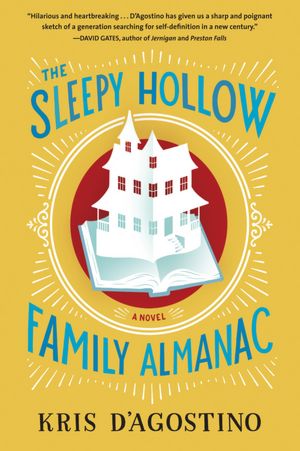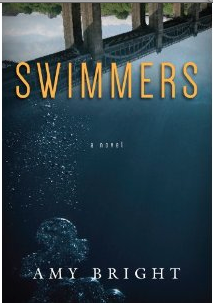The Sleepy Hollow
Family Almanac by Kris D’Agostino reminded me how much I read books based
on what I’ve heard about them, or if I’ve
heard about them – it isn’t often that I just pick something up without reading
the back, recognizing the author, or knowing something about the title. Not so
with Family Almanac. It was just a
random pick-up, and I’m so glad I found it.
The novel follows Calvin Moretti, as he ditches Boston
University and returns home to Sleepy Hollow, New York, where he moves back in
with his parents, his brother Chip, and his seventeen-year-old sister Elissa. Calvin
reverts to his high school self, spending long hours in his bedroom, high and
masturbating (“To take my mind off this horrifying scenario, I count the number
of girls near my chair whom I would have sex with. I stop at eighteen,
realizing my standards have fallen to fantastic new lows”), where he lies “on
the floor listening to Appalachian folk music from the 1920s until I can’t keep
my eyes open anymore, at which point I crawl into bed and drift off.”
His father, a pilot, has been diagnosed with cancer and is
so obsessed with his mortality that he wanders around in his dressing gown with
a gun sticking out of his pocket. His end-of-the-world provisions (the rice,
guns, oil, and canned beans stacked in the garage) coupled with crippling
medical bills are slowly bankrupting the family. Calvin might have had to move
home, but there might not be a family home to live in for long. He saves as
much money as he can (most of it is directed to student loans), looking at
apartments and knowing that he can’t, at twenty-four-years-old, afford to move
out on his own. Although he has a job working as a preschool teacher for
developmentally challenged children, it does not pay enough for him to get by.
Calvin’s stuck, not just because of his financial situation,
but his inability to make something happen. As he sits in his car “waiting at
the lights on the way home, I look at myself in the rearview mirror. ‘Just do something.’” Moving back home places him
in an ambivalent position, where he is no longer taken care of by his parents,
but still relies on them for his basic needs. He doesn’t so much revert back to
his teenage self but feels as if he has been given permission not to leave it: “I
look at my reflection in the doors and am embarrassed that I still dress like a
teenager: dirty jeans, T-shirt.” He is invited to the wedding of an old friend
from school that he hasn’t talked to in years, and the event is one of the
highlights of the novel (he brings his dad as his date, and his dad brings his
gun). Calvin can’t shake free from the idea that he is doing something wrong
with his life, and that everybody else has somehow magically figured it out: “I’m
jealous even of my classmates who seem to have set up miserable lives for
themselves. At least they have lives. I’m convinced of this. Any life is better
than aimlessness.”
D’Agostino narrates in a detached, but reflective way, and
sentences end almost lyrically, transforming characters’ words from the mundane
to the poetic:
“Dad passed his stress test,” Elissa says.
“I know, I say. “He’s downstairs crying about it right now.”
The weeks tumble by. I do not get in their way.
and
“I’ll drive back,” I say. “Jesus.”
“Watch it,” my grandmother says. “He hears you.”
and
“Do you want to know the sex?” he asks. We look at Elissa.
“Let’s be surprised,” she says.
Memory entangles with the present situation: Chip, helping
to support the family by paying the mortgage; Calvin, feeling a responsibility
to help out, but never quite putting a plan into action; and Elissa, her own
teen pregnancy complicating the tenuous family situation. Calvin can’t find a
present, mostly because returning home forces him to live in a nebulous shadow
of the past. Memory is everywhere, and he spends a considerable time writing in
his own journal, if not changing the situation, at least trying to understand it:
“When I was thirteen,
I played a year of Little League baseball. Mostly as an unspoken favor to my
father. They stuck me in right field, the only position where I might possibly
avoid all contact with the ball. I batted seventh in the order. Once, during a
game toward the end of the season, a fastball hit me square in the nose,
knocking the plastic helmet off my head and splaying me out in the dirt. When I
came to, I could taste blood in my mouth. My father was squatting over me,
along with Coach Ruggiero and half the team. He put his hand under my head,
told me not to move. I didn’t want to get up. I would’ve stayed there forever.
I have never felt as safe as I did lying there with a broken nose.”
D’Agostino tackles that current economic clime, where return
home is a narrative of post adolescence. The writing is in the vein of Dave
Eggers and Jeffrey Eugenides, and shows Cal's inability to change the
stagnant situation of his life.





No comments:
Post a Comment